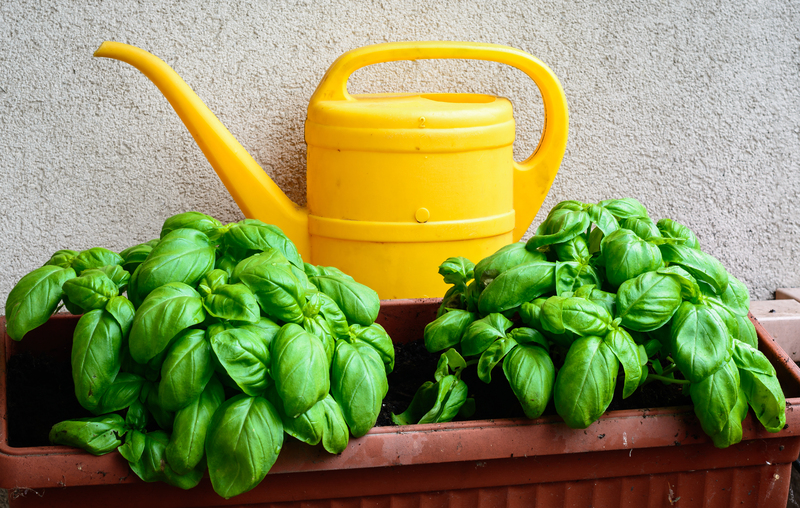Navigate the world of plants with 9 crucial tips for gardening beginners
Posted on 24/05/2025
Navigate the World of Plants with 9 Crucial Tips for Gardening Beginners
Welcome to the exciting journey of gardening! Regardless of whether you have a spacious backyard or a small balcony, gardening for beginners can be a rewarding experience. As you navigate the world of plants, you will not only enhance the beauty of your surroundings but also connect deeply with nature, reduce stress, and cultivate the satisfaction of nurturing life. This comprehensive guide unveils 9 essential gardening tips designed specifically for beginners, helping you avoid common mistakes and flourish in your new green adventure.
Table of Contents
- 1. Understand Your Local Environment
- 2. Choose the Right Gardening Location
- 3. Start with Easy-to-Grow Plants
- 4. Learn About Soil Health
- 5. Master the Fundamentals of Watering
- 6. Fertilize Wisely
- 7. Know How and When to Prune
- 8. Watch for Pests and Diseases
- 9. Be Patient and Persistent


Getting Started: The Joys and Benefits of Gardening
If you are new to plant care, you are in for a rewarding experience. Gardening isn't just a hobby; it's a practice that touches every sense and enriches both your home and your life. Beginners might feel overwhelmed by choices and advice, but understanding the basics of gardening will help you flourish from the very start.
1. Understand Your Local Environment
Assess Your Climate and Growing Zone
One of the fundamental steps for gardening newcomers is to know your local environment. Climate plays a significant role in the types of plants you can grow. Research your regional USDA Hardiness Zone or equivalent in your country to find plants that thrive in your region. Consider:
- Average temperatures
- Rainfall frequency
- Seasonal changes
- Sunlight exposure
Selecting plants adapted to your area can dramatically simplify plant care and enhance your success as a beginner gardener.
2. Choose the Right Gardening Location
Maximize Sunlight and Accessibility
All plants need light--whether you're growing vibrant flowers or delicious herbs. Before planting, spend a few days observing your outdoor or indoor space to identify areas with optimal sunlight. Most edible plants and many favorites like roses and sunflowers require at least 6 hours of direct sun each day. When selecting your site, also consider:
- Accessibility: Choose an area you visit frequently; it will remind you to care for your plants regularly.
- Proximity to water: Picking a location near a water source simplifies maintenance.
- Protection from wind: Wind can damage or dry out tender young plants quickly.
If you have only indoor space, place containers near south-facing windows for best light.
3. Start with Easy-to-Grow Plants
Plant Selection for Novice Gardeners
Navigating the world of plants can feel daunting, but new gardeners should focus on varieties that are hardy, low-maintenance, and forgiving of mistakes. Here are some great starter plants for gardening beginners:
- Sunflowers: Fast-growing and rewarding with large, cheerful blooms.
- Marigolds: Tough and pest-resistant, perfect for flower beds or containers.
- Lettuce and salad greens: Quick yield and easy to grow in small spaces or pots.
- Herbs (basil, mint, parsley): Hardy, delicious, and usable in daily cooking.
- Succulents: Require minimal watering and boast unique shapes for indoor gardens.
Starting with robust varieties increases your chances of early success and builds your confidence as you explore more complex plant species.
4. Learn About Soil Health
The Importance of a Good Foundation
Your plant's roots depend on healthy, fertile garden soil. Rich soil retains the right amount of moisture, drains well, and supplies vital nutrients. To create the best environment for your plants, prioritize these factors:
- Soil testing: Simple home kits can reveal your soil's pH and nutrient levels.
- Adding compost: Mix in organic matter such as kitchen scraps or leaf litter to improve soil fertility and structure.
- Mulching: Apply a layer of organic mulch (wood chips, straw, or leaves) to conserve moisture and suppress weeds.
If you're working with poor native soil or limited space, raised beds or container gardening filled with high-quality potting mix can be ideal.
5. Master the Fundamentals of Watering
Consistent and Appropriate Moisture
Overwatering and underwatering are among the most common mistakes for new gardeners. Every plant has unique watering needs, but these general guidelines will keep your garden hydrated:
- Finger test: Poke your finger into the soil; if the top inch is dry, it's time to water.
- Morning routine: Water in the early morning to reduce evaporation and minimize leaf diseases.
- Deep, infrequent watering: Encourages deeper roots and stronger plants compared to shallow daily splashes.
- Use mulch: It helps maintain soil moisture between watering sessions.
Remember, plants in containers dry out faster than those planted in the ground, so check them often, especially during hot weather.
6. Fertilize Wisely
Support Growth Without Overfeeding
All plants need nutrients for healthy growth. Garden fertilizers supplement the soil with essential elements like nitrogen, phosphorus, and potassium. However, too much fertilizer can damage delicate roots or cause run-off. Follow these prudent guidelines:
- Read the label: Choose fertilizers appropriate for your specific plant types and follow directions precisely.
- Compost and manure: These organic options enrich the soil and improve plant health naturally.
- Frequency: Most gardens only need fertilizing a few times per year, not every week.
If in doubt, it's better to under-fertilize than overdo it. Plants can recover from a slight nutrient deficiency but not from toxic overload.
7. Know How and When to Prune
Encourage Growth and Prevent Disease
Pruning may seem intimidating, but it's a crucial skill for beginner gardeners to master. Pruning helps shape plants, promote healthier growth, and prevent disease by increasing air circulation. Basic pruning tips include:
- Use clean, sharp tools: Dirty or blunt shears can harm plants and spread diseases.
- Remove dead or damaged growth: Cut back to healthy tissue to encourage recovery.
- Prune at the right time: For most flowering plants, prune right after they bloom; for fruit trees, late winter or early spring is ideal.
When in doubt, prune less; you can always cut more later!
8. Watch for Pests and Diseases
Early Detection Leads to Healthy Plants
Even in the best conditions, pests and diseases can challenge your gardening efforts. An important part of gardening for beginners is learning to identify problems early and act promptly. Monitor your plants for:
- Chewed leaves or stems (common signs of caterpillars or snails)
- Discolored or wilted foliage (may indicate disease or improper watering)
- Sticky residue (a sign of pests like aphids)
Whenever possible, use organic pest management answers such as hand-picking bugs, encouraging helpful insects (like ladybugs), or using neem oil and soapy water sprays. Healthy, well-watered plants are naturally more resilient to threats.
9. Be Patient and Persistent
The Most Essential Gardening Tip of All
Perhaps the most crucial lesson as you navigate the path of plant care is to realize that gardening is a journey, not a race. Plants take time to establish roots, grow, blossom, and fruit. Weather setbacks, unsuccessful seeds, or the occasional pest are all part of the process. Remember:
- Every garden, big or small, is built through patience, observation, and trial-and-error.
- Record your progress: Keep a simple gardening journal to track what works and what doesn't.
- Celebrate small successes, from a single unfurling leaf to your first homegrown tomato.
With time, gardening for beginners becomes an art one continuously improves upon. Embrace the journey and enjoy the many physical and mental rewards it brings!
Conclusion: Growing with Confidence as a Gardening Beginner
Starting your own garden might seem overwhelming, but with these 9 crucial tips for novice gardeners, you'll find it easier to navigate the world of plants and create a flourishing patch of green. Remember that every plant is unique, and part of the joy is learning with each new growing season. Whether you're focused on indoor plant care, balcony gardening, or outdoor vegetable beds, practice these essential plant care fundamentals and watch your confidence--and garden--grow.
Recommended Reading
- Beginner Gardener's Guide - National Gardening Association
- Royal Horticultural Society: Gardening for Beginners
- Pest Control for Beginners - Gardener's Supply
Ready to begin? Get your hands in the dirt, nurture your seedlings, and enjoy the remarkable world of gardening!
Latest Posts
Safeguarding Your Garden from Harsh Weather Assault
Boost privacy with these 9 effective and fast-growing hedges
Tips to Combat Severe Wind Effects in Your Garden
Gardening Aesthetics: Cutting-edge Hedge Trimming Techniques

